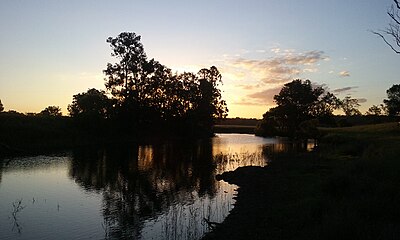This article needs additional citations for verification .(March 2025) |
| Nanango Weir | |
|---|---|
 | |
| Location | 9.6 km (6 mi) North West of Nanango, Queensland |
| Coordinates | 26°39′01″S151°55′28″E / 26.650182°S 151.924437°E |
| Type | Weir |
| Primary inflows | Barkers Creek |
| Primary outflows | Barkers Creek |
| Basin countries | Australia |
Nanango Weir is a weir located near Nanango, Queensland, Australia. It was originally constructed only used by nearby farms for agricultural use, though public recreation is now permitted.
Contents
The weir is located on Barkers Creek. [1]
